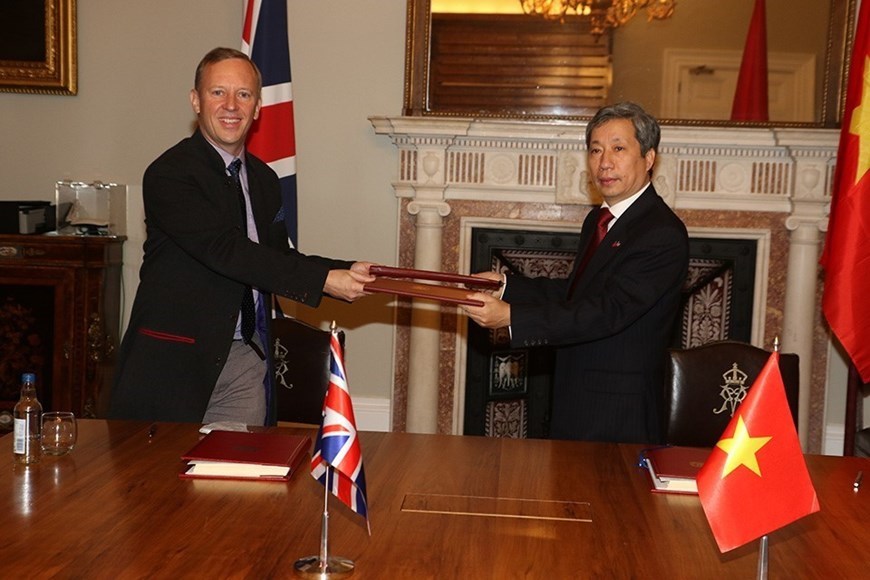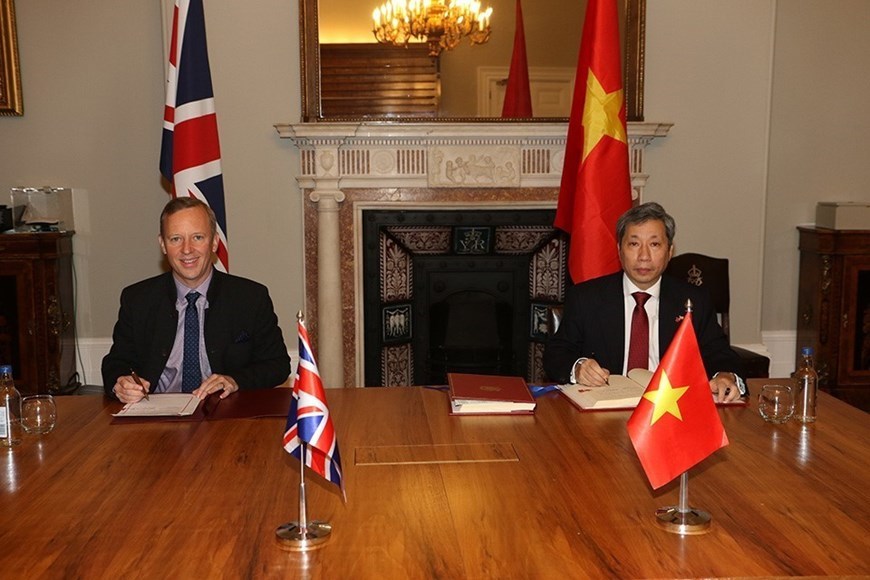Representatives from Vietnam and the United Kingdom signed a free trade agreement between the two countries in London on December 29 evening (Vietnam time).
The two countries’ ambassadors were authorised to sign the deal as leading officials of the Vietnamese Government and Minister of Industry and Trade Tran Tuan Anh were unable to travel to the UK to sign directly amid the COVID-19 pandemic.
Earlier on December 11, Minister Anh and UK Secretary of State for International Trade Elizabeth Truss signed the minutes on the conclusion of negotiations over the UKVFTA to create a foundation for the two nations to conduct necessary legal documents for the official signing.
The UKVFTA was negotiated based on principles of commitments of the EU-Vietnam FTA with necessary adjustments to ensure the deal conforms with the Vietnam-UK bilateral trade framework.
Accordingly, the deal includes nine articles, one Appendix revising some articles of the EVFTA, one Protocol and one bilateral exchange letter between Vietnam and the UK.
Currently, the two sides are rushing to complete domestic procedures in accordance with the laws of each party so as to ensure the agreement can be implemented from 23:00 on December 31.
In the context that the UK official left the EU and the Brexit transition period is about to end on December 31, the signing of the free trade agreement will ensure the bilateral trade cannot be disrupted.
As it inherits the EVFTA, the UK-Vietnam Free Trade Agreement will create a comprehensive, long-term and stable economic-trade cooperation framework between the two countries, thus contributing to deepening their multifaceted cooperation, especially when the two sides just extended the maintenance of bilateral relations at the strategic partnership level.
Vietnam and the UK set up diplomatic relations in 1973. Over the past 47 years, bilateral ties have unceasingly developed. According to the General Department of Vietnam Customs, two-way trade reached 6.6 billion USD in 2019.
The UK has been the third largest trade partner of Vietnam in Europe after Germany and the Netherlands in recent years.
Vietnam mainly exports garment and textiles, footwear, wood and wooden furniture and seafood to the UK, while importing pharmaceuticals, machineries and equipment from the UK.
Due to impacts of the COVID-19 pandemic, as of the end of October, two-way trade reached only 4.7 billion USD, down about 15 percent, with Vietnam’s exports to the UK hitting 4.1 billion USD, a decline of 14.19 percent year on year.
In the first eight months of 2020, the UK run 400 valid projects in Vietnam with total registered capital of 3.6 billion USD, ranking 16th among countries and territories investing in Vietnam.
However, the investment scale has yet to match the potential of the UK – one of the largest countries in terms of investing abroad with about 300 billion USD each year. The UKVFTA is expected to bring about more investment and cooperation opportunities for the two sides, supporting them in post-pandemic recovery.
Areas which the UK is strong in and Vietnam needs include renewable energy, consumer goods production, and greenhouse gas emission mitigation.
UK-Vietnam FTA to elevate bilateral strategic partnership: ambassador
The UK-Vietnam Free Trade Agreement (UKVFTA) is expected to intensify economic cohesion and reciprocation between the two countries, thus deepening and elevating the bilateral strategic partnership, said a diplomat.
The pact was signed by the two countries in London on December 29 evening (Vietnamese time), following the conclusion of negotiations on December 11.
This is a historic event that plays an important role in the bilateral ties, Vietnamese Ambassador to the UK Tran Ngoc An affirmed during an interview with the Vietnam News Agency (VNA).
As a new-generation, high-quality deal, UKVFTA aims to completely eliminate import taxes as well as non-tariff barriers on goods from the two countries under a short roadmap, he said.
It also contains important provisions on intellectual property rights, investment liberalisation, and sustainable development, according to the ambassador.
The pact is intended to ensure that there will be no interruption to the Vietnam-UK trade because of Brexit, the ambassador said, adding that the deal, to be put into place in early 2021 right after the transitional period of the UK’s Brexit expires on December 31, will facilitate the smooth flow of goods between the two countries, especially necessities amidst the complex development of COVID-19.
He added that UKVFTA will help boost the volume of goods from both sides entering the other’s market.
Over the past years, especially since the establishment of the strategic partnership in 2010, trade between Vietnam and the UK has enjoyed double-digit increases, from 2 billion USD to 6.6 billion USD in 2019, with Vietnam’s exports 5.7 billion USD.
In the first 11 months of this year, despite the adverse impact of Brexit and COVID-19, the two-way trade stilled reached some 5.2 billion USD.
Only two days after the signing of the agreement, more than 70 percent of Vietnamese exports and 65 percent of goods from the UK will enjoy tax reductions, with many subject to a zero percent tariff.
After six years, the zero percent tariff will be levied on more than 99 percent of goods traded between the two countries, the ambassador said.
According to An, Vietnam’s exports such as electronics, garments-textiles, footwear, agricultural products like rice, coffee and rubber, seafood, and timber and ceramic products, and the UK’s medicine, machinery, equipment, chemicals, auto, banking and insurance would benefit much from the deal.
He, therefore, suggested UK firms to engage in pharmaceutical distribution in the Southeast Asian nation.
The ambassador called attention to a fact that although Vietnam’s exports to the UK rose sharply over the past decade, the export revenue made up less than 1 percent of the UK’s import value.
“There are still substantial potential and opportunities for Vietnamese goods to penetrate the UK if Vietnam knows how to optimise the trade deal,” he said, suggesting local firms strive to meet high-quality requirements regarding quality, packaging, hygiene and environment.
With its openness, the UK market has been regarded as a playground of many countries, which requires competitive prices of Vietnamese goods, he said. “Vietnamese businesses need to further improve product quality and reduce prices, while stepping up marketing and product promotion.”
Notably, “trust” is the prerequisite for Vietnamese goods to gain a firm foothold in the UK market, he stressed.
UKVFTA is a step forward of the UK towards becoming a dialogue partner of ASEAN and a member of the Comprehensive and Progressive Agreement for Trans-Pacific Partnership (CPTPP) in a near future as Vietnam is a constructive member of ASEAN and a founding member of CPTPP.
With a population of nearly 100 million, Vietnam has set up links with 60 economies worldwide through 15 FTA, both bilateral and multilateral, the ambassador elaborated.
Moreover, the trade deal would trigger a new wave of direct and indirect investments from the UK, particularly in renewable energy and environmental technology that are of the country’s strength, An noted./.
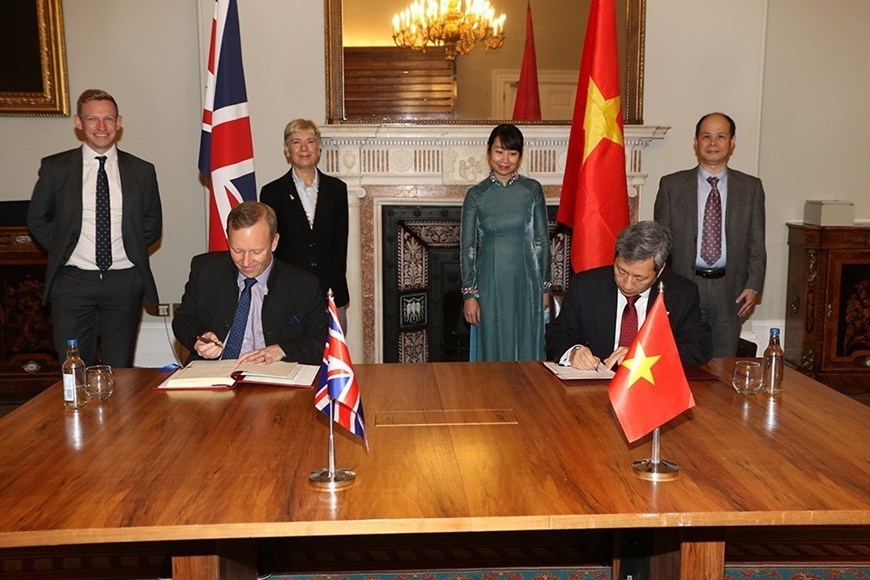 |
||
|
The UK-Vietnam Free Trade Agreement is negotiated based on principles of commitments of the EU-Vietnam FTA with necessary adjustments to ensure the deal conforms with the Vietnam-UK bilateral trade framework. In the photo: Vietnamese Ambassador to the UK Tran Ngoc An and Vietnamese Ambassador to Vietnam Gareth Edward Ward sign the free trade agreement. (Photo: VNA)
|
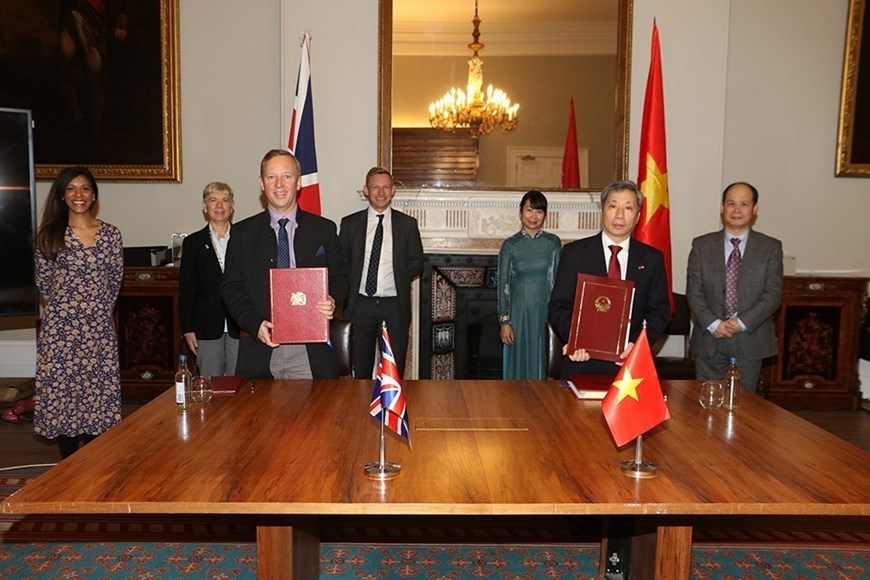 |
||
|
|
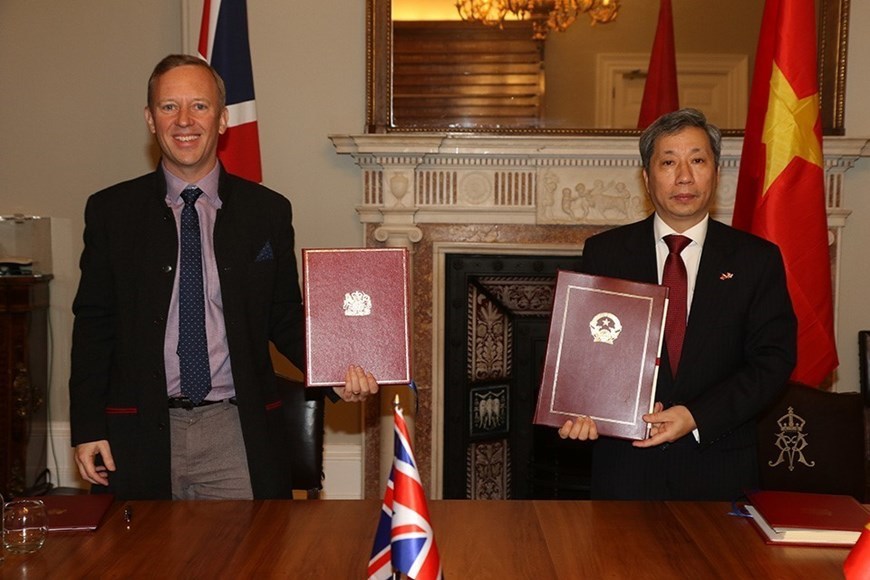 |
|
|
VNA/VNN
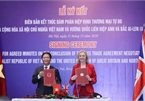
UKVFTA ushers in new opportunities for Vietnam-UK trade
The conclusion of the UK-Vietnam Free Trade Agreement (UKVFTA) demonstrates the importance of Vietnam as a market and its heightened position in the eyes of the UK,
